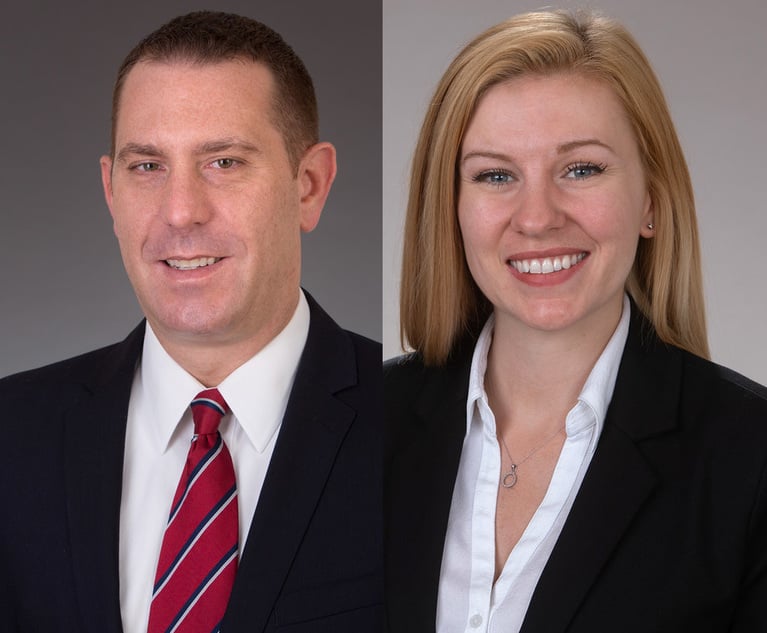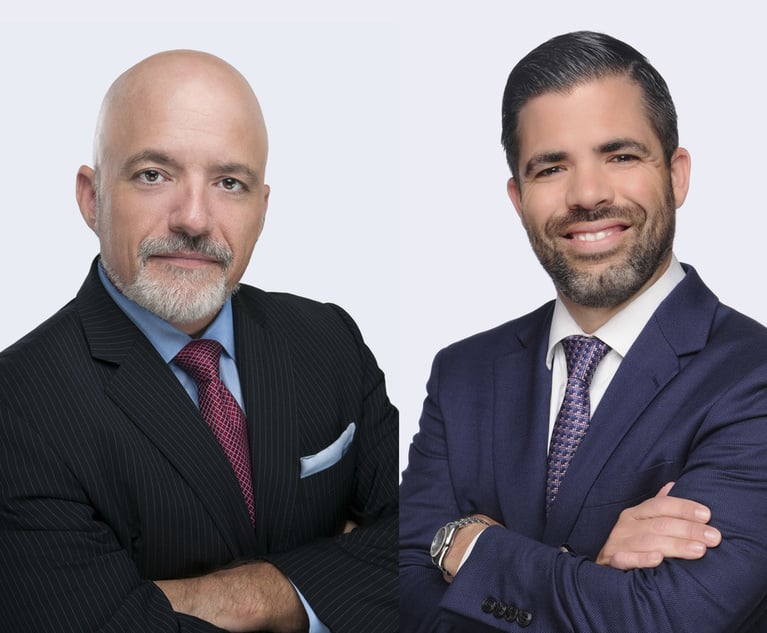Paycheck Protection Loans—Staying Afloat in the Midst of a Pandemic
The Coronavirus Aid, Relief, and Economic Security (CARES) Act was signed into law on March 27, and provides protection to millions of Americans employed by small businesses through additional avenues than those already in existence in order to assist small businesses to stay afloat amid the current coronavirus global pandemic and looming economic crisis.
March 31, 2020 at 05:15 PM
5 minute read
 Harsh Arora, with Kelley Kronenberg.
Harsh Arora, with Kelley Kronenberg.
The Coronavirus Aid, Relief, and Economic Security (CARES) Act was signed into law on March 27, and provides protection to millions of Americans employed by small businesses through additional avenues than those already in existence in order to assist small businesses to stay afloat amid the current coronavirus global pandemic and looming economic crisis.
The CARES Act directs $349 billion toward a federal small business loan program called the Paycheck Protection Program (PPP) which is designed to provide capital to small businesses quickly and to incentivize job retention. This allows businesses to be proactive now in order to combat and mitigate potential losses.
The PPP applies to many types of businesses, including eligible nonprofits, veteran's organizations, tribal concerns, sole proprietorships with 500 or fewer employees (unless certain businesses in certain industries met certain standards) and will even apply to self-employed individuals as well as independent contractors. Businesses must satisfy the U.S. Small Business Administration's (SBA) definition of a small business concern as well as the size standards for small business. A size standard represents the largest size that a business (including its subsidiaries and affiliates) may be to be classified as a small business by the SBA, and are based on the average annual receipts or the average number of employees of a business. What classifies as a "small" business varies by industry. If a business owner is unsure of whether or not their business classifies as a small business, they should consult counsel to assist navigating the SBA's size standards in order to determine accurate classification.
The PPP provides an additional avenue than the low-interest federal disaster loans for working capital offered by the SBA. Although the SBA's disaster loans may overlap the PPP in terms of what the loans can be used for, the eligibility and amounts are different. Unlike the PPP, the disaster loans must be requested first by the Governor of a State or Territory and only offer up to $2 million in assistance to small businesses suffering substantial economic injury as a result of the coronavirus pandemic.
Some key information regarding the PPP and the loans from 1800 approved lenders is as follows:
- The loans provided under the PPP fall under Section 7 of the Small Business Act;
- Small businesses have until June 30, 2020 to apply;
- The loans are fully guaranteed by the U.S. government through Dec. 31, 2020;
- Provides a direct incentive for small businesses to keep employees on the payroll:
- If all employees are kept on payroll for 8 weeks, then the SBA will forgive, on a tax-free basis, the portions of the loans that are used for payroll, rent, mortgage interest, utilities, healthcare benefits for employees, and may even cover interest payments on other debts;
- Up to 100% of the loan is forgivable;
- Loan forgiveness is contingent upon the employer:
- Not reducing workforce during an 8-week period compared to other eight-week periods in 2019 and 2020;
- Not reducing the salary of wages paid to any employee who earned less than $100,000.00 in annualized salary by more than 25% during the covered period;
- Total will be reduced if a workforce is drawn down through attrition or if wages have been reduced;
- If a small business is forced to lay off employees due to economic conditions, then they may be able to preserve some of the loan guarantee by hiring those employees back;
- The maximum loan amount is the lesser of:
- $10 million; or
- Sum of business's average monthly "payroll costs" for the 1-year period ending on the date the loan was made (alternate calculation available for seasonal employees) MULTIPLIED by 2.5 PLUS any disaster loan taken out after Jan. 1, 2020 that has been refinanced into a paycheck protection loan under the PPP;
- Businesses may still receive funding through the PPP if those businesses have pending SBA disaster assistance loans as long as each of the loans are being applied to different cost centers;
- The loans have a maximum maturity of 10 years;
- The interest rates on the loans under the PPP must not exceed 4%;
- The standard fees imposed under Section 7 of the Small Business Act are waived;
- No personal guarantee from business owners required;
- To receive a loan, a small business must have been in business as of Feb. 15, 2020;
- Loans are to be made available starting Friday, April 3, 2020, with the goal of same day loan evaluation services;
- All deferments through are now automatic until Dec. 31, 2020.
If small businesses have not acted in preparation and/or in response to the current and ensuing economic impacts from the coronavirus pandemic, they should begin preparing and assessing what will be needed to stay afloat through this uncertainty. As additional information is on its way, small businesses should consult counsel in order to discuss and assist deciding the most effective course of action, including applying for funding provided by the SBA, including those provided through the PPP.
For more information regarding the assistance provided through the SBA's disaster relief loans, please see the author's other article titled, COVID-19 Assistance from the Small Business Administration in Kelley Kronenberg's Resource Center: COVID-19, under the Business Law heading ( https://bit.ly/3dGNbFP ), or contact him through the information provided below.
Disclaimer: This article is intended to provide you with general information regarding the impact of a potential or actual coronavirus pandemic. The contents of this article are not intended to provide specific legal advice.
Harsh Arora, a partner in Kelley Kronenberg's Fort Lauderdale office, focuses his practice on business litigation and handling complex and international corporate transaction matters. He has represented multinational businesses as their outside general counsel. Contact him at [email protected] or 954-256-0743.
This content has been archived. It is available through our partners, LexisNexis® and Bloomberg Law.
To view this content, please continue to their sites.
Not a Lexis Subscriber?
Subscribe Now
Not a Bloomberg Law Subscriber?
Subscribe Now
NOT FOR REPRINT
© 2025 ALM Global, LLC, All Rights Reserved. Request academic re-use from www.copyright.com. All other uses, submit a request to [email protected]. For more information visit Asset & Logo Licensing.
You Might Like
View All
Trending Issues in Florida Construction Law That Attorneys Need to Be Aware Of
6 minute read


Law Firms Mentioned
Trending Stories
- 1Don’t Blow It: 10 Lessons From 10 Years of Nonprofit Whistleblower Policies
- 2AIAs: A Look At the Future of AI-Related Contracts
- 3Litigators of the Week: A $630M Antitrust Settlement for Automotive Software Vendors—$140M More Than Alleged Overcharges
- 4Litigator of the Week Runners-Up and Shout-Outs
- 5Linklaters Hires Four Partners From Patterson Belknap
Who Got The Work
J. Brugh Lower of Gibbons has entered an appearance for industrial equipment supplier Devco Corporation in a pending trademark infringement lawsuit. The suit, accusing the defendant of selling knock-off Graco products, was filed Dec. 18 in New Jersey District Court by Rivkin Radler on behalf of Graco Inc. and Graco Minnesota. The case, assigned to U.S. District Judge Zahid N. Quraishi, is 3:24-cv-11294, Graco Inc. et al v. Devco Corporation.
Who Got The Work
Rebecca Maller-Stein and Kent A. Yalowitz of Arnold & Porter Kaye Scholer have entered their appearances for Hanaco Venture Capital and its executives, Lior Prosor and David Frankel, in a pending securities lawsuit. The action, filed on Dec. 24 in New York Southern District Court by Zell, Aron & Co. on behalf of Goldeneye Advisors, accuses the defendants of negligently and fraudulently managing the plaintiff's $1 million investment. The case, assigned to U.S. District Judge Vernon S. Broderick, is 1:24-cv-09918, Goldeneye Advisors, LLC v. Hanaco Venture Capital, Ltd. et al.
Who Got The Work
Attorneys from A&O Shearman has stepped in as defense counsel for Toronto-Dominion Bank and other defendants in a pending securities class action. The suit, filed Dec. 11 in New York Southern District Court by Bleichmar Fonti & Auld, accuses the defendants of concealing the bank's 'pervasive' deficiencies in regards to its compliance with the Bank Secrecy Act and the quality of its anti-money laundering controls. The case, assigned to U.S. District Judge Arun Subramanian, is 1:24-cv-09445, Gonzalez v. The Toronto-Dominion Bank et al.
Who Got The Work
Crown Castle International, a Pennsylvania company providing shared communications infrastructure, has turned to Luke D. Wolf of Gordon Rees Scully Mansukhani to fend off a pending breach-of-contract lawsuit. The court action, filed Nov. 25 in Michigan Eastern District Court by Hooper Hathaway PC on behalf of The Town Residences LLC, accuses Crown Castle of failing to transfer approximately $30,000 in utility payments from T-Mobile in breach of a roof-top lease and assignment agreement. The case, assigned to U.S. District Judge Susan K. Declercq, is 2:24-cv-13131, The Town Residences LLC v. T-Mobile US, Inc. et al.
Who Got The Work
Wilfred P. Coronato and Daniel M. Schwartz of McCarter & English have stepped in as defense counsel to Electrolux Home Products Inc. in a pending product liability lawsuit. The court action, filed Nov. 26 in New York Eastern District Court by Poulos Lopiccolo PC and Nagel Rice LLP on behalf of David Stern, alleges that the defendant's refrigerators’ drawers and shelving repeatedly break and fall apart within months after purchase. The case, assigned to U.S. District Judge Joan M. Azrack, is 2:24-cv-08204, Stern v. Electrolux Home Products, Inc.
Featured Firms
Law Offices of Gary Martin Hays & Associates, P.C.
(470) 294-1674
Law Offices of Mark E. Salomone
(857) 444-6468
Smith & Hassler
(713) 739-1250






